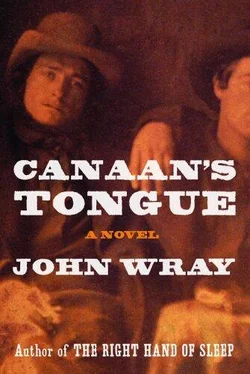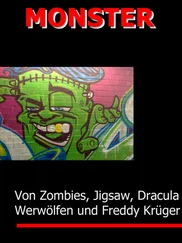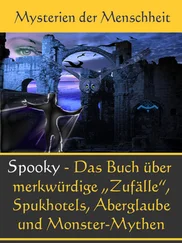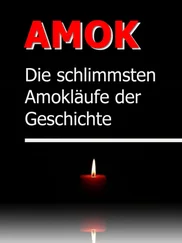A farmer’s boy, I thought. Or a brother from St. Benedict’s. “Just bring one along next time.” I winked at him. “Or two.”
He was still staring down at his britches. “France must be a singular nation,” he said at last.
“I wouldn’t know to tell,” I said. I went and pulled the shutters closed. “Have you ever been with a working lady, Mr. Ball?”
“I don’t recall,” he said, avoiding my look. “Virgil, miss, is my Christian name.” So saying he undid his britches and let them drop.
I stopped short in the middle of the room. “Mother of Providence,” I murmured.
His face went flat. “I can’t help the way I’m fashioned,” he said quietly.
I laughed at him then! I couldn’t help but laugh. He’d never been with any sort of girl at all — I knew that now. “Don’t curse your lot too hard, sirrah. The Lord might reconsider.”
He blinked both eyes at this—: his blue one and his white. “Do you mean to say—”
“Pay me no mind,” I said, throwing back the bed-covers. They’d not been aired and as I parted them they gave off a sour, pricklish smell—; but he made no gesture or remark. I smiled at him. “Step out of your trappings, Virgil, if you’re ready.”
But my laughter had unsteadied him and he stood mute and stone-bodied by the bed. Had he not dropped his bottoms I might have found reason to laugh again—; but there were qualities to his naked self would have commanded respect in any house of fun in Louisiana.
“This room has a peculiar smell to it,” he said after a time. He turned about in a circle, sniffing. “Is it coming from the street?”
As I watched him the memory of my first day in that house came out of the dark and brushed me. The smell of it. A chicken-yard smell, sourish and stifling. The noises half-muffled by the thin cane doors. I’d sat on the iron steps for half the day, tracing the arabesques and curls. I was a girl even then—; I knew I was. But a little girl no longer.
“It’s the smell of the house,” I said. “You’ll get adjusted.” I patted the sheets. “Come over here to me.”
When he came to the bed he seemed to remember why he’d taken off his pants. He reached out and slid the night-shirt off my shoulders. “I don’t mind a bit of laughter,” he said. “I’ve been laughed at before. I’m well out from under my mother’s skirts.”
“How old are you?” I asked, pulling him down.
“Twenty-seven.”
A moment passed, no longer than a breath, and I was ready.
He was lying beside me now and I undid the rest of the buttons. “Kiss me, Virgil,” I said, laying his hands on my belly. He obeyed with a singular will and the hour passed quicker than many I’d spent in that house. He was one of those whose first pass is slow and arduous and nearly without release, but he had a patience with himself that took me quite aback. I’d expected a rough time of it from the look of him, but he handled me as though I was one of his fancy parchments. When it was done he asked, as so many of them do, what was my reckoning of it and I said I imagined there to be some small hope. He seemed satisfied with that for an answer.
DIRECTLY HE’D FINISHED I went to the night-pot and had a wash. He watched me like I was turning pig-shite into beer. I made a face at him. “Find this very appetizing, do you?”
“It’s an education to me, miss,” he said.
“Come over here, then. I’ll educate you something more. Bring that bottle with you. There—: that one, from the night-stand.”
He did as he was told.
“Unscrew the top of it.” I turned a cart-wheel then, and stood up on my hands.
“Catch hold of me now!” I said. “Catch hold of me with your hand. There! Keep the bottle in the other, mind.”
“Do you do this with every caller?” he asked, gawking down at me.
“With every one that forgets his envelopes,” I answered. “That’s poison in that bottle, Mr. B.”
“Poison?” he stammered. “Ma’am — I mean to say, Miss Clementine—”
“It’s a caution, you silly man! That’s all.” I opened up my legs. “Now! Pour it on my shemmy.”
And he did.
“There,” I said. “Now you’ve gotten your degree.”
“I have at that,” he said, and kissed my heel.
I was beginning to see his merits.
As there were no further callers that day we lay back down in bed, sipping rum-and-bitters, watching the afternoon roll over.
“I’d not have thought it was like that, ” he said.
“What?” I said. “The befores or the afters?”
“All of it.” He smiled. “You’ll laugh at me, miss. My ideas about it came from Byron.”
“Who?” I said.
He looked at me. “George Gordon, Lord Byron,” he said very slowly.
“I see,” I said. “A lord. Is he another of your crew?”
He gave a little cough. “Byron is the bravest of our poets.”
“We’ve never had any lords here, that I can remember. Some as claimed they were lords. I’ll ask the girls—”
“Do you not read poetry at all?” he said. He sat up in the bed. “I have a book for you to read.” His eyes were bright. “Books. I have several volumes—”
“Pray don’t leave your volumes here, Mr. Ball. I want nothing with any volumes of yours, I’m sure.”
“What?” he said. “What’s that?” He looked as though I’d caught him at something. “Do you not read books?”
“You could teach me,” I said. I said it the way I might have said—: You could bring me my lousing-powder from the cupboard. But I said it just the same.
He went quieter than before. “Have you never learned at all,” he said at last.
I rolled my eyes.
“But you speak elegantly,” he said. “I wish I could speak half as elegantly as you.”
“I’m not half-witted, Mr. Ball.”
“No! Decidedly you aren’t.” He grinned.
He said nothing for a piece after that and when he did it was with the voice he’d used when he’d first stepped in. Could we have another try, he asked me, and of course I let him. But I wasn’t to be fooled. Something had started him to thinking. He was thinking on it all the time he was having his way and when at last he’d spent, more properly this time, he still hadn’t done with it.
We were lying just as we’d been before. From the hall came sounds of the whist room being readied for the R—.
“Why bring his fancy friends here?” I asked. “There’s many finer accommodation-shops in the Quarter.”
Virgil opened his good eye. “Ask me no questions, miss,” he said. I cursed him. “You’ve got no idea yourself,” I said, hoping to shake an answer from him. “Your sweet R— hasn’t told you jack-all.”
He looked at me sharply. “Why ask me, then, if you know his ways and means so well?”
I sat up very straight. “You have no idea? Really?”
He shook his head.
I laughed at him. “I see the kind of gang you’ve got. Does he tell you anything at all?”
He didn’t answer straightaway. The noise of a trap and harness carried brightly up from the street. “It’s me who tells him things,” he said at last.
“What’s that, Mr. B?” I laughed again. “Are you his privy counselor?”
“Look here,” he said, and held his blighted eye open. “Closer.” He took me by the shoulder. “This is how.”
I looked into the eye, or what little I could see of it—: most of it was tucked under the lid. It peeped out at nothing like a new moon, jet-colored and set. I was in Tennessee once, where there was snow on the ground, and the meat of that eye was that very same color—: snow over a dark, empty rabbit-hole. I looked closer and saw my own pale face reflected.
Читать дальше












